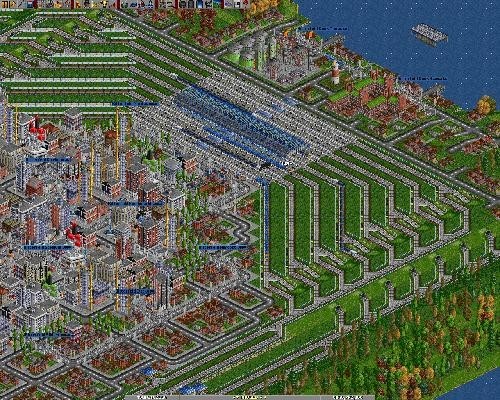

National Bank: Replaces the bank graphics with a bank in a restored historical building that nicely blends with the original game’s graphics style.Main HQ: Replaces the company headquarters, with heliport, flags and roof antennas.Heliport: Replaces the default heliport, features semi-transparent landing platform.Font Renew: Replaces the default TTD font with the Tahoma (bold) 8pt font.Airport Asphalt: Replaces the large airport’s asphalt, with darker pavement and sharp lines.Under normal settings, tracks are unfortunately too cheap to lay, you can just lay your own parallel set of competing tracks while leveling half of the land in the process.Īnother possibility is multiplayer, with several players on the same game company. > and of letting other companies run trains on your tracks etc? The most important rail infrastructure decisions are between conventional/electrified rails, monorail and maglev, that requires actually replacing all your rails/stations/depots/trains infrastructure in one go.
#OPENTTD UPGRADE AIRPORT UPDATE#
You can enable this in OpenTTD options, but it's mostly a very easy drag-select to simply update your entire rail grid to catenary powered ones. This happens in the OpenTTD too if you start offering non-rail passenger transit. > the historical drop in rail passenger traffic in 20th century Yes, it's reasonably easy to generate huge ammounts of positive cashflow, but if you find that bad, you can just give your money to other players in multiplayer, raise and lower sea, or bribe a random town authority until enough money vanishes. > Some years ago I tried it and found that it is quite easy to reach a state where there is too much clashflow, post that there isn't much of a further challenge? Is that still the case? The games are most fun when your own creative ideas have enough breathing room to grow. I would say the proper balance is one where you can run out of cash, but aren't likely to if you just apply a modicum of business sense. It is something of a cursed problem in game design for sure - if you make the basic act of surviving too hard, you limit player expression and fun if you make it too easy, you can just as well remove the money system entirely. This was also the case for Chris Sawyer's later games too - Roller Coaster Tycoon 1 and 2 challenged you not just with having a cash positive park, but with meeting goals under a time limit or with other restrictions. Once you have a grasp of how income is calculated, there are lots of exploits you can do as well to make money practically infinite. Can you survive with only buses? Only boats? Make the most optimal rail network? etc. Playing without rival companies is more of a sandbox than anything, where you have to make your own challenges and goals. Which is a lot more fun if you can play against humans rather than AI. Getting cash positive isn't the real challenge, the challenge is growing faster than the competition. That was the case in the original Transport Tycoon Deluxe, if memory serves right. There's hardly any open-source project or game that declares itself "complete" The fact that many of these engines are not (yet) complete is certainly not exclusive to game reimplementations. A game that's completeable but lacks music, for example, is certainly not "useless". The whole spectrum is present in ScummVM's engines at almost any point in time, as there are new engines constantly being added and others perfected. music/sound effects/animations), games that are perfectly playable and completeable, and even games that have improvements upon the original games. Your example of ScummVM is a bad one: in ScummVM there are games that show nothing but a title screen, games where about half of the game works, games that are completeable but are lacking some aspect (e.g. These sort of projects tend to be pretty large and also fairly binary: either it's complete, useful, and playable, or it's not (yet) complete and it's unplayable and useless.Įverything is "binary" if you choose an arbitrary cutoff point.


 0 kommentar(er)
0 kommentar(er)
